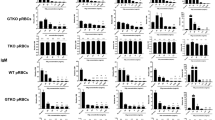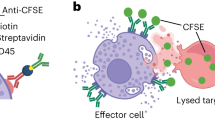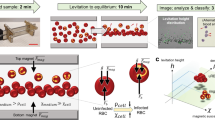Abstract
WE have investigated the stage in erythroblast maturation at which erythrocyte membrane antigens first appear, using an antiserum which lysed rabbit erythrocytes. Mature acidophilic erythroblasts were lysed with a lower concentration of antiserum (complement in excess) than were the less mature basophilic cells.
This is a preview of subscription content, access via your institution
Access options
Subscribe to this journal
Receive 51 print issues and online access
$199.00 per year
only $3.90 per issue
Buy this article
- Purchase on Springer Link
- Instant access to full article PDF
Prices may be subject to local taxes which are calculated during checkout
Similar content being viewed by others
References
Borsook, H., Ratner, K., Tattrie, B., and Lajtha, L. G., Nature, 217, 1024 (1968).
Talmage, D. W., Freter, G. G., and Taliaferro, W. H., J. Infect. Dis., 98, 300 (1956); Stelos, P., and Talmage, D. W., J. Infect. Dis., 100, 126 (1957).
Borsos, T., and Rapp, H. J., Science, 150, 505 (1965).
Author information
Authors and Affiliations
Rights and permissions
About this article
Cite this article
BORSOOK, H., RATNER, K. & TATTRIE, B. Differential Immune Lysis of Erythroblasts. Nature 221, 1261–1262 (1969). https://doi.org/10.1038/2211261b0
Received:
Revised:
Published:
Issue Date:
DOI: https://doi.org/10.1038/2211261b0
This article is cited by
-
Immunochemical properties of antigens present on immature erythrocytes from mouse and rat
Blut (1981)
-
Analysis of erythropoeisis at the molecular level
Nature (1976)
-
Human Normoblast A Antigen seen by Immunoelectron Microscopy
Nature (1974)
-
Antigen Density on Differentiating Erythroid Cells
Nature New Biology (1972)
Comments
By submitting a comment you agree to abide by our Terms and Community Guidelines. If you find something abusive or that does not comply with our terms or guidelines please flag it as inappropriate.



